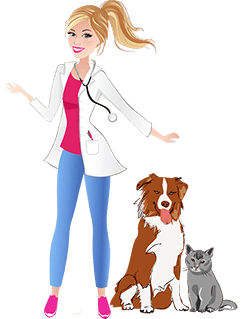What It Means To Be A Responsible Dog Owner

September is back-to-school season, the beginning of autumn, and…Responsible Dog Ownership Month! Whether you’re a longtime pup parent looking to brush up on your parenting skills or you’re bringing home a furry friend for the first time, now is the perfect time to learn the basics of responsible pet parenthood.
The team at The Vet Gal and Guys breaks down the basics of responsible dog ownership in this blog.
The Building Blocks of Responsible Dog Ownership
Preventive Veterinary Care
The first thing you should do when you bring a new dog home is establish care with a veterinarian. New puppies will need continued check-ups and vaccines. A wellness visit for a furry friend you adopt from a shelter establishes a baseline for your pup’s health.
At each wellness visit, your vet may:
- Perform a physical, nose-to-tail examination to check your dog’s health
- Ask questions about your pup’s lifestyle, diet, activity level, behavior, and urination/defecation patterns
- Conduct bloodwork for a complete blood count (CBC) and a biochemistry profile
- Test for parasites
- Microchip your pup
- Discuss the benefits of spaying and neutering your dog
Based on what your veterinarian learns about your pet, she may make recommendations for preventive care. This could include vaccinations, heartworm prevention medication, dental X-rays and cleanings, and more. It all depends on your pup’s health.
Dental Care for Dogs
Did you know that dogs would benefit from twice-daily tooth-brushing, just like humans do? Even though this might seem impossible, it’s important to brush your dog’s teeth at least three times a week and schedule a yearly dental exam.
A whopping 80 to 90% of dogs over the age of three live with dental disease. Dental disease doesn’t just affect your pup’s mouth. It can negatively affect a dog’s overall health. Dental disease has even been linked with heart and liver problems.
So get in the habit of brushing your pup’s teeth and schedule a full dental exam every year. It’s one of the simplest, yet most powerful ways to protect your dog’s health.
Healthy Nutrition and Exercise for Dogs
Giving your dog a nutritious diet doesn’t mean cooking him raw, homemade food every day. The kibble you find at the pet store is FDA-regulated and provides the complete set of nutrients your dog needs.
For extra-healthy nutrition for dogs, choose food that incorporates plenty of animal products, grains, fruits, and veggies. As omnivores, dogs thrive with a balance of these ingredients.
Your pup should also get at least 30 minutes of exercise if he’s a low-energy breed or upwards of two hours if he’s got lots of energy. Make sure you bring home a furry friend whose energy levels match yours!
Grooming for Dogs
Long-haired pups will need daily brushing. Shorter-haired fur-babies can make do with a thorough brushing session three times a week to remove dead hair. You’ll need to bathe your dog (and clip her nails!) about once a month and, if she has long hair, trim it every two months.
Make sure you’re ready to keep your dog fresh and clean. And if some of the grooming tasks sounds daunting, you can always hire the task out by sending Fido to the groomer for nail trims and ear cleanings! For a traveling vet visit, ring (817) 733-3011. We can’t wait to meet your fur-baby!



